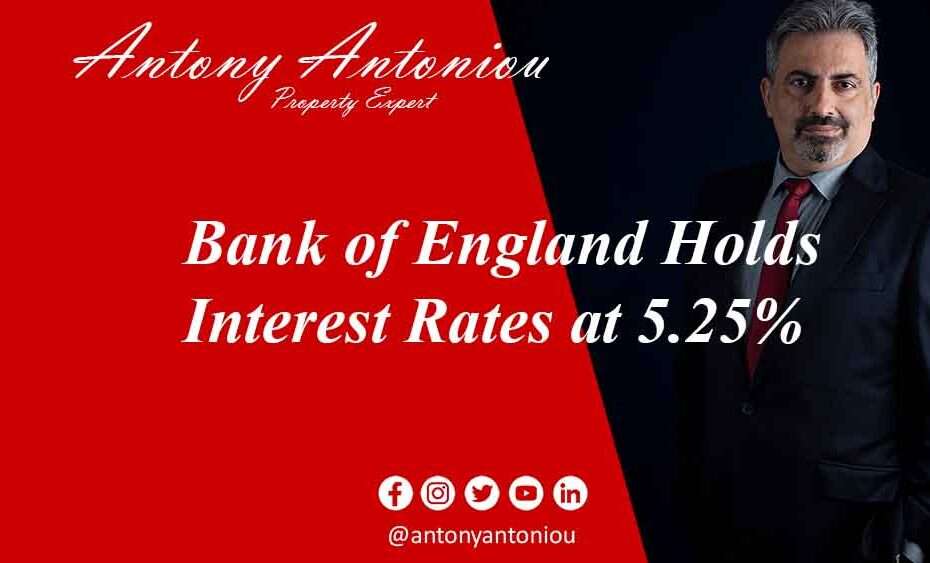Bank of England Holds Interest Rates at 5.25%
What It Means for You
The Rates Decision
The Bank of England’s Monetary Policy Committee (MPC), comprising nine economists responsible for setting interest rates, has decided to maintain the base rate at 5.25%. This marks the sixth consecutive hold since the rate first reached this level in August 2023. The Committee meets eight times a year to deliberate on interest rate adjustments.
Implications for Borrowers and the Government
The decision to keep rates unchanged is disappointing news for many individuals seeking to remortgage their homes, as they were hoping for a decrease in mortgage rates. Furthermore, the Conservative government, led by Prime Minister Rishi Sunak, had pinned its strategy for the upcoming general election on the expectation of interest rate cuts and subsequent tax reductions.
Sunak’s administration has already implemented two tax cuts through National Insurance reductions, but their high command was anticipating another reduction before the general election. Despite the disappointment, Downing Street was likely aware that an interest rate cut was improbable at this meeting.
The MPC Minutes and Future Rate Cuts
While the MPC minutes are yet to be released, they are expected to provide hints about the possibility of interest rate cuts in the near future. The government is likely to cling to these comments as an indication of an improving economy, despite the challenging circumstances faced by hard-pressed families with mortgages.
Opposition Response
Rachel Reeves, the Shadow Chancellor of the Exchequer, has already accused ministers of “gaslighting” the British public about the state of the economy. She argues that anyone who believes the economy is improving must be woefully out of touch, suggesting that wealthy Tories fail to understand the realities faced by ordinary citizens.
The Inflation Conundrum
The overwhelming 7-2 majority vote to maintain the bank rate at 5.25% reflects concerns about potential inflation spikes. Although the next inflation figure, due later this month, is expected to be lower than the current 3.2% and potentially even below the 2% target, global financial markets are signaling rising commodity prices driven by geopolitical risks.
The OPEC (Organization of the Petroleum Exporting Countries) energy exporters’ cartel is working in tandem with non-OPEC member Russia to limit oil supplies and keep prices high. While the Bank of England’s actions do not directly impact global oil markets, higher oil and gas prices lead to increased transportation and food production costs, ultimately fueling domestic inflation.
The Path Forward and Interest Rate Cuts
Despite the challenges, there is speculation that interest rates could be lower than their current level by the end of the year. However, the government’s hopes of three or four cuts before the general election may not be realized, with analysts predicting a maximum of one or two cuts due to the potential resurgence of inflation during the summer months.
The two dissenting MPC members who voted for a rate cut highlight the divergence of opinions within the Committee. Some argue that the Bank of England is too timid in taking action without the approval of its American counterparts, the Federal Reserve.
Calls for Cognitive Diversity
Criticisms have been raised regarding the lack of cognitive diversity within the MPC, with calls for the inclusion of individuals with diverse perspectives and intellectual grit. The argument is that the Committee should have individuals who challenge conventional wisdom, such as the notion that post-lockdown inflation would be transitory, a claim that many economists disputed at the time.
Britain boasts talented economists, and there is a need for more diversity of opinion on the MPC, reflecting a range of viewpoints that can contribute to effective policymaking.
The Looming Tax Hike Debate
In a separate development, the National Institute of Economic and Social Research (NIESR), a respected economic think tank, has warned that any government elected in the next general election may need to raise taxes, potentially increasing income tax by up to 3%, to fund public services and address the nation’s debt burden.
The NIESR’s apolitical stance lends credibility to this assessment, which is based on the economic reality of sluggish growth and a shrinking economy per capita over the past two years. As the population grows and the economic pie fails to expand, the slices available to individuals become smaller, exacerbating pressure on public finances.
The NIESR’s findings suggest that without robust economic growth, the political landscape becomes increasingly contentious, as there is no “feel-good factor” and the Conservatives find themselves in a challenging position.
Conclusion
The Bank of England’s decision to maintain interest rates at 5.25% has significant implications for borrowers, the government’s economic strategy, and the overall cost of living. While the prospect of future rate cuts provides a glimmer of hope, the specter of resurgent inflation and the need for potential tax hikes highlight the complexities facing policymakers as they navigate the turbulent economic waters. Ultimately, the path forward will require careful consideration of diverse viewpoints and a delicate balancing act between promoting growth, managing inflation, and addressing the nation’s fiscal challenges.

